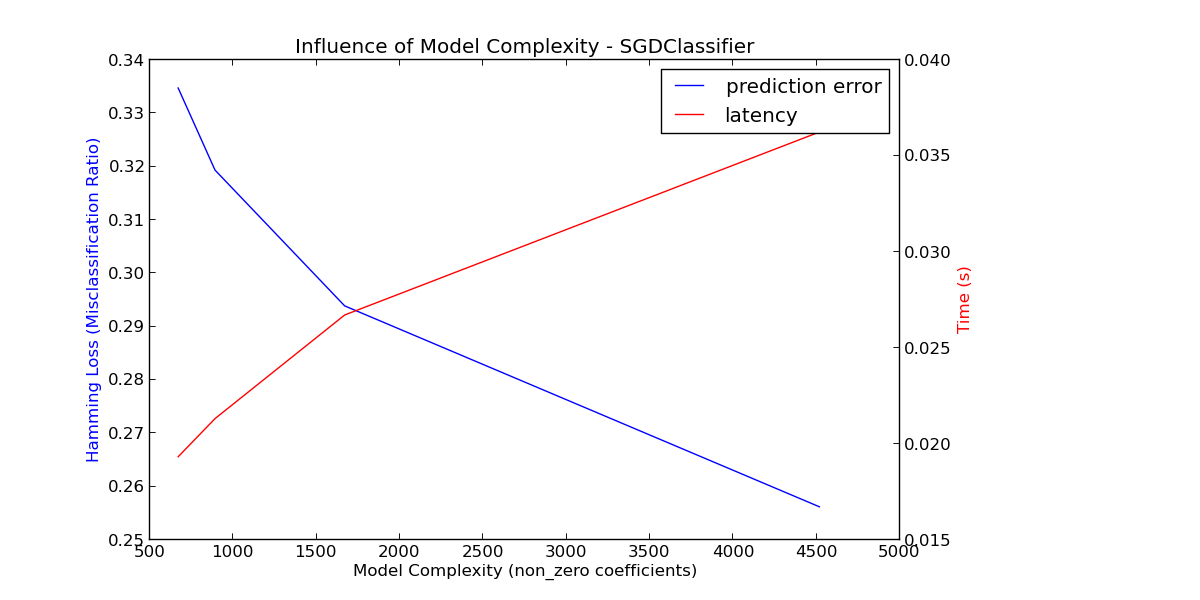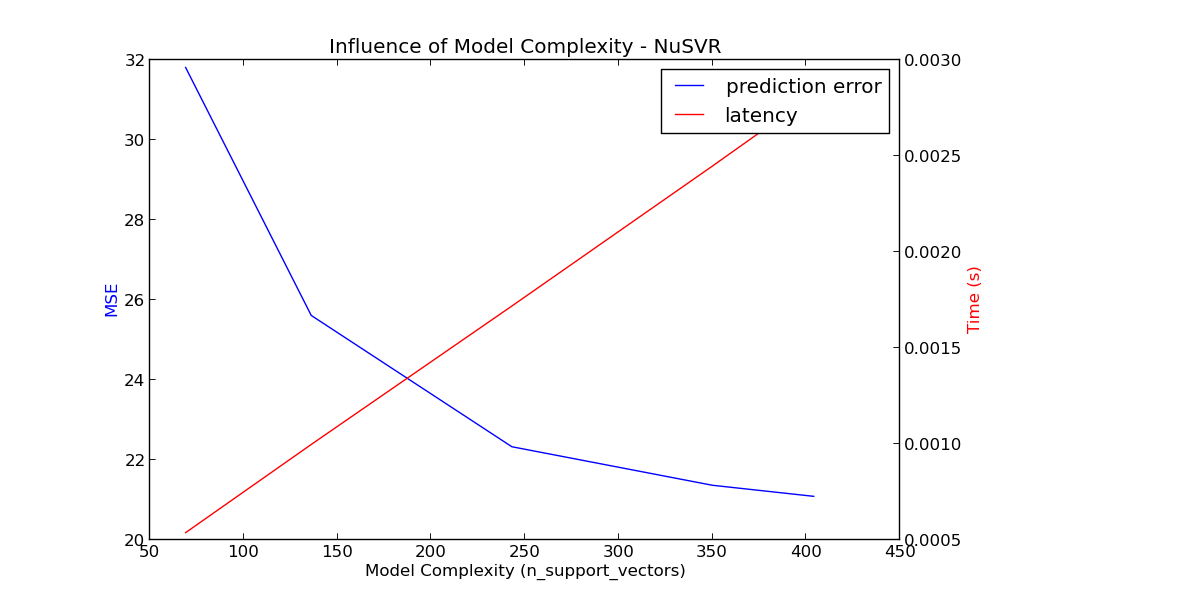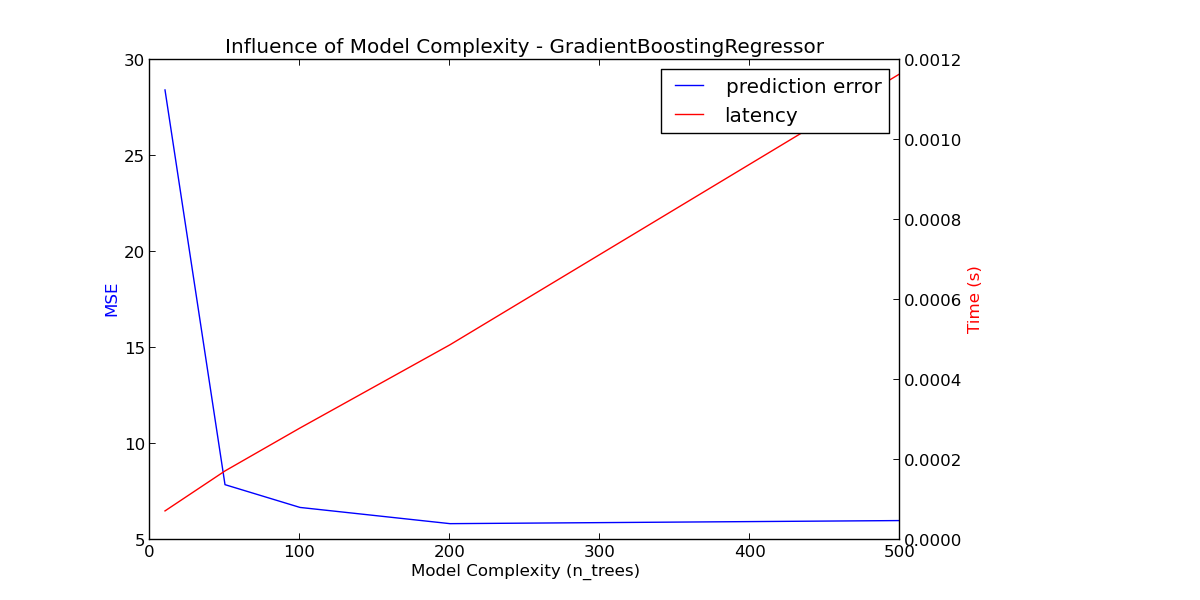Model Complexity Influence¶
Demonstrate how model complexity influences both prediction accuracy and computational performance.
The dataset is the Boston Housing dataset (resp. 20 Newsgroups) for regression (resp. classification).
For each class of models we make the model complexity vary through the choice of relevant model parameters and measure the influence on both computational performance (latency) and predictive power (MSE or Hamming Loss).
Script output:
Benchmarking SGDClassifier(alpha=0.001, class_weight=None, epsilon=0.1, eta0=0.0,
fit_intercept=True, l1_ratio=0.25, learning_rate='optimal',
loss='modified_huber', n_iter=5, n_jobs=1, penalty='elasticnet',
power_t=0.5, random_state=None, shuffle=False, verbose=0,
warm_start=False)
Complexity: 4516 | Hamming Loss (Misclassification Ratio): 0.2562 | Pred. Time: 0.036248s
Benchmarking SGDClassifier(alpha=0.001, class_weight=None, epsilon=0.1, eta0=0.0,
fit_intercept=True, l1_ratio=0.5, learning_rate='optimal',
loss='modified_huber', n_iter=5, n_jobs=1, penalty='elasticnet',
power_t=0.5, random_state=None, shuffle=False, verbose=0,
warm_start=False)
Complexity: 1668 | Hamming Loss (Misclassification Ratio): 0.2939 | Pred. Time: 0.026719s
Benchmarking SGDClassifier(alpha=0.001, class_weight=None, epsilon=0.1, eta0=0.0,
fit_intercept=True, l1_ratio=0.75, learning_rate='optimal',
loss='modified_huber', n_iter=5, n_jobs=1, penalty='elasticnet',
power_t=0.5, random_state=None, shuffle=False, verbose=0,
warm_start=False)
Complexity: 890 | Hamming Loss (Misclassification Ratio): 0.3194 | Pred. Time: 0.021321s
Benchmarking SGDClassifier(alpha=0.001, class_weight=None, epsilon=0.1, eta0=0.0,
fit_intercept=True, l1_ratio=0.9, learning_rate='optimal',
loss='modified_huber', n_iter=5, n_jobs=1, penalty='elasticnet',
power_t=0.5, random_state=None, shuffle=False, verbose=0,
warm_start=False)
Complexity: 669 | Hamming Loss (Misclassification Ratio): 0.3347 | Pred. Time: 0.019336s
Benchmarking NuSVR(C=1000.0, cache_size=200, coef0=0.0, degree=3, gamma=3.0517578125e-05,
kernel='rbf', max_iter=-1, nu=0.1, probability=False, random_state=None,
shrinking=True, tol=0.001, verbose=False)
Complexity: 69 | MSE: 31.8133 | Pred. Time: 0.000538s
Benchmarking NuSVR(C=1000.0, cache_size=200, coef0=0.0, degree=3, gamma=3.0517578125e-05,
kernel='rbf', max_iter=-1, nu=0.25, probability=False,
random_state=None, shrinking=True, tol=0.001, verbose=False)
Complexity: 136 | MSE: 25.6140 | Pred. Time: 0.000998s
Benchmarking NuSVR(C=1000.0, cache_size=200, coef0=0.0, degree=3, gamma=3.0517578125e-05,
kernel='rbf', max_iter=-1, nu=0.5, probability=False, random_state=None,
shrinking=True, tol=0.001, verbose=False)
Complexity: 243 | MSE: 22.3315 | Pred. Time: 0.001719s
Benchmarking NuSVR(C=1000.0, cache_size=200, coef0=0.0, degree=3, gamma=3.0517578125e-05,
kernel='rbf', max_iter=-1, nu=0.75, probability=False,
random_state=None, shrinking=True, tol=0.001, verbose=False)
Complexity: 350 | MSE: 21.3679 | Pred. Time: 0.002448s
Benchmarking NuSVR(C=1000.0, cache_size=200, coef0=0.0, degree=3, gamma=3.0517578125e-05,
kernel='rbf', max_iter=-1, nu=0.9, probability=False, random_state=None,
shrinking=True, tol=0.001, verbose=False)
Complexity: 404 | MSE: 21.0915 | Pred. Time: 0.002822s
Benchmarking GradientBoostingRegressor(alpha=0.9, init=None, learning_rate=0.1, loss='ls',
max_depth=3, max_features=None, max_leaf_nodes=None,
min_samples_leaf=1, min_samples_split=2, n_estimators=10,
random_state=None, subsample=1.0, verbose=0, warm_start=False)
Complexity: 10 | MSE: 28.4402 | Pred. Time: 0.000073s
Benchmarking GradientBoostingRegressor(alpha=0.9, init=None, learning_rate=0.1, loss='ls',
max_depth=3, max_features=None, max_leaf_nodes=None,
min_samples_leaf=1, min_samples_split=2, n_estimators=50,
random_state=None, subsample=1.0, verbose=0, warm_start=False)
Complexity: 50 | MSE: 7.8822 | Pred. Time: 0.000173s
Benchmarking GradientBoostingRegressor(alpha=0.9, init=None, learning_rate=0.1, loss='ls',
max_depth=3, max_features=None, max_leaf_nodes=None,
min_samples_leaf=1, min_samples_split=2, n_estimators=100,
random_state=None, subsample=1.0, verbose=0, warm_start=False)
Complexity: 100 | MSE: 6.6961 | Pred. Time: 0.000280s
Benchmarking GradientBoostingRegressor(alpha=0.9, init=None, learning_rate=0.1, loss='ls',
max_depth=3, max_features=None, max_leaf_nodes=None,
min_samples_leaf=1, min_samples_split=2, n_estimators=200,
random_state=None, subsample=1.0, verbose=0, warm_start=False)
Complexity: 200 | MSE: 5.8514 | Pred. Time: 0.000488s
Benchmarking GradientBoostingRegressor(alpha=0.9, init=None, learning_rate=0.1, loss='ls',
max_depth=3, max_features=None, max_leaf_nodes=None,
min_samples_leaf=1, min_samples_split=2, n_estimators=500,
random_state=None, subsample=1.0, verbose=0, warm_start=False)
Complexity: 500 | MSE: 6.0121 | Pred. Time: 0.001166s
Python source code: plot_model_complexity_influence.py
print(__doc__)
# Author: Eustache Diemert <eustache@diemert.fr>
# License: BSD 3 clause
import time
import numpy as np
import matplotlib.pyplot as plt
from mpl_toolkits.axes_grid1.parasite_axes import host_subplot
from mpl_toolkits.axisartist.axislines import Axes
from scipy.sparse.csr import csr_matrix
from sklearn import datasets
from sklearn.utils import shuffle
from sklearn.metrics import mean_squared_error
from sklearn.svm.classes import NuSVR
from sklearn.ensemble.gradient_boosting import GradientBoostingRegressor
from sklearn.linear_model.stochastic_gradient import SGDClassifier
from sklearn.metrics.metrics import hamming_loss
###############################################################################
# Routines
# initialize random generator
np.random.seed(0)
def generate_data(case, sparse=False):
"""Generate regression/classification data."""
bunch = None
if case == 'regression':
bunch = datasets.load_boston()
elif case == 'classification':
bunch = datasets.fetch_20newsgroups_vectorized(subset='all')
X, y = shuffle(bunch.data, bunch.target)
offset = int(X.shape[0] * 0.8)
X_train, y_train = X[:offset], y[:offset]
X_test, y_test = X[offset:], y[offset:]
if sparse:
X_train = csr_matrix(X_train)
X_test = csr_matrix(X_test)
else:
X_train = np.array(X_train)
X_test = np.array(X_test)
y_test = np.array(y_test)
y_train = np.array(y_train)
data = {'X_train': X_train, 'X_test': X_test, 'y_train': y_train,
'y_test': y_test}
return data
def benchmark_influence(conf):
"""
Benchmark influence of :changing_param: on both MSE and latency.
"""
prediction_times = []
prediction_powers = []
complexities = []
for param_value in conf['changing_param_values']:
conf['tuned_params'][conf['changing_param']] = param_value
estimator = conf['estimator'](**conf['tuned_params'])
print("Benchmarking %s" % estimator)
estimator.fit(conf['data']['X_train'], conf['data']['y_train'])
conf['postfit_hook'](estimator)
complexity = conf['complexity_computer'](estimator)
complexities.append(complexity)
start_time = time.time()
for _ in range(conf['n_samples']):
y_pred = estimator.predict(conf['data']['X_test'])
elapsed_time = (time.time() - start_time) / float(conf['n_samples'])
prediction_times.append(elapsed_time)
pred_score = conf['prediction_performance_computer'](
conf['data']['y_test'], y_pred)
prediction_powers.append(pred_score)
print("Complexity: %d | %s: %.4f | Pred. Time: %fs\n" % (
complexity, conf['prediction_performance_label'], pred_score,
elapsed_time))
return prediction_powers, prediction_times, complexities
def plot_influence(conf, mse_values, prediction_times, complexities):
"""
Plot influence of model complexity on both accuracy and latency.
"""
plt.figure(figsize=(12, 6))
host = host_subplot(111, axes_class=Axes)
plt.subplots_adjust(right=0.75)
par1 = host.twinx()
host.set_xlabel('Model Complexity (%s)' % conf['complexity_label'])
y1_label = conf['prediction_performance_label']
y2_label = "Time (s)"
host.set_ylabel(y1_label)
par1.set_ylabel(y2_label)
p1, = host.plot(complexities, mse_values, 'b-', label="prediction error")
p2, = par1.plot(complexities, prediction_times, 'r-',
label="latency")
host.legend(loc='upper right')
host.axis["left"].label.set_color(p1.get_color())
par1.axis["right"].label.set_color(p2.get_color())
plt.title('Influence of Model Complexity - %s' % conf['estimator'].__name__)
plt.show()
def _count_nonzero_coefficients(estimator):
a = estimator.coef_.toarray()
return np.count_nonzero(a)
###############################################################################
# main code
regression_data = generate_data('regression')
classification_data = generate_data('classification', sparse=True)
configurations = [
{'estimator': SGDClassifier,
'tuned_params': {'penalty': 'elasticnet', 'alpha': 0.001, 'loss':
'modified_huber', 'fit_intercept': True},
'changing_param': 'l1_ratio',
'changing_param_values': [0.25, 0.5, 0.75, 0.9],
'complexity_label': 'non_zero coefficients',
'complexity_computer': _count_nonzero_coefficients,
'prediction_performance_computer': hamming_loss,
'prediction_performance_label': 'Hamming Loss (Misclassification Ratio)',
'postfit_hook': lambda x: x.sparsify(),
'data': classification_data,
'n_samples': 30},
{'estimator': NuSVR,
'tuned_params': {'C': 1e3, 'gamma': 2**-15},
'changing_param': 'nu',
'changing_param_values': [0.1, 0.25, 0.5, 0.75, 0.9],
'complexity_label': 'n_support_vectors',
'complexity_computer': lambda x: len(x.support_vectors_),
'data': regression_data,
'postfit_hook': lambda x: x,
'prediction_performance_computer': mean_squared_error,
'prediction_performance_label': 'MSE',
'n_samples': 30},
{'estimator': GradientBoostingRegressor,
'tuned_params': {'loss': 'ls'},
'changing_param': 'n_estimators',
'changing_param_values': [10, 50, 100, 200, 500],
'complexity_label': 'n_trees',
'complexity_computer': lambda x: x.n_estimators,
'data': regression_data,
'postfit_hook': lambda x: x,
'prediction_performance_computer': mean_squared_error,
'prediction_performance_label': 'MSE',
'n_samples': 30},
]
for conf in configurations:
prediction_performances, prediction_times, complexities = \
benchmark_influence(conf)
plot_influence(conf, prediction_performances, prediction_times,
complexities)
Total running time of the example: 29.36 seconds ( 0 minutes 29.36 seconds)




